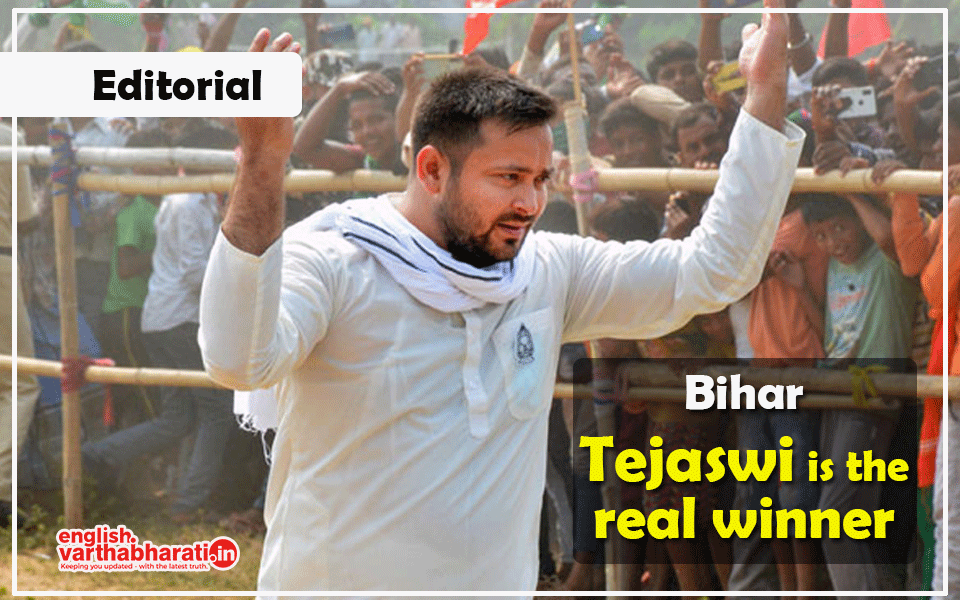Bihar, the state that had stood up against communalism and stopped Advani’s rath yatra when it was spreading hatred throughout the country, is now virtually in the hands of the BJP. Lalu Prasad Yadav who had saved Bihar from communal hatred is in jail. Modi has achieved what Advani failed at by using socialist leaders. BJP has won Bihar in the name of NDA. Nitish’s party has personally lost the elections. Compared to Nitish, RJD led by Tejaswi Yadav who is very young has won maximum seats. While RJD that contested in 144 constituencies won 75 seats, the JDU that contested in 115 seats has won only 43 seats and BJP has won 74 seats. The strength of the JDU that won 71 seats in the 2015 elections has been reduced to 43 seats. The BJP that had then won 53 seats has increased its tally to 74. Though BJP has captured Bihar that was in the hands of regional parties through Nitish, Bihar has accepted Tejaswi Yadav as its future leader. BJP has already announced Nitish Kumar as the NDA Chief Minister. Tragically, though he has become Bihar’s Chief Minister with the support of the BJP, the people of Bihar have partially rejected him. In the absence of Lalu Prasad Yadav, the way Tejaswi strengthened the party and captured 75 seats is a huge development in Bihar. The Bihar election results have shown that the era of senior and seasoned politicians such as Nitish and Lalu Prasad Yadav has ended and a new era of young politicians has begun.
Conscientious citizens had great expectations from the Bihar Assembly elections as the elections were held after the sustained dark period post the Coronavirus and lockdown. Bihar that has the maximum number of migrant labourers suffered enormously due to the lockdown. The government that failed to handle the Coronavirus and imposed a nation-wide lockdown transferred the lives of the poor from the frying pan to the fire. Also, the several anti-people policies of the Central government impacted the lives of the common man of Bihar. In such a grim scenario, it is normal for an election to throw up an anti-establishment result. But BJP has emerged as the second largest party in the state. Not just this, it has also partially eaten away at a regional party rooted in the state such as the JDU. With the memories of the pain of lockdown still etched in public memory, BJP improving its performance tremendously in Bihar is a defeat of the ‘politics of development.’ In a way, this election has primarily given a ‘small clean chit’ to Modi from the losses the country suffered due to the lockdown. Even though there was rampant misuse of power, misuse of media, brazen display of money power, and a full display of Modi’s lies, none of them seemed to have mattered in the election. However, by contributing to the growth of BJP, Nitish Kumar and Dalit youth leader Chirag Paswan have cheated the victims of the lockdown in the Assembly elections.
Election analysis reports are referring to the significant role played by Asaduddin Owaisi and Chirag Paswan. Of these two leaders who have proclaimed themselves as leaders of two communities that are experiencing maximum distress, Chirag Paswan, son of Ramvilas Paswan, has admitted openly that he contested against the JDU to strengthen the BJP. But perhaps Paswan has no answers as to how strengthening the BJP would help him politically or how the Dalit community would benefit. During the campaign, Chirag spoke in support of Modi. In public rallies, Chirag, who did not even mistakenly utter the name of Ambedkar, was citing the name of Modi as though he would be his savior. He regarded Nitish’s defeat as his victory and succeeded in achieving that but he won only one seat. The politics of Chirag Paswan who hails from a community that is defeated is directionless. Forget benefitting Dalits, he is not benefitting from his politics.
Owaisi’s is a different case. Owaisi has clarified after the election results that though he was interested in being a part of Mahaghatbandhan, everyone considered him as an untouchable. By bagging five seats in the elections, Owaisi’s party has registered surprising results. There is no doubt that Asaduddin, who has won the best parliamentarian award, is a seasoned politician. But other secular parties hesitated to identify themselves with his party that targets Muslims as its base. Having taken this as a challenge, Owaisi not only chose to field candidates in several constituencies but also won five seats and proved his stature. Parties such as Congress that are politically pushing the minorities into a corner have no moral authority to hold Owaisi responsible for their failures. Congress leaders who believe that Muslims will not win if they are given tickets are solely responsible for Owaisi winning five seats. Though the Muslim, Dalit, and secular votes are divided differently, the one promising factor that has emerged is the emergence of RJD as a major political force. At the same time, the Left has captured 16 seats having joined hands with other parties. If they come out of their superiority bubble, the Left parties have the potential to play a significant role in the country’s politics by joining hands with other political parties to defeat communal and anti-Constitutional forces. The election results have thus conveyed a clear message to the leaders of the left parties who should amplify their intellect to absorb this message.
The results of by-elections in Karnataka, held along with Bihar elections, are not even worth analyzing. If Munirathna’s money power won the elections in RR Nagar, in Sira, BJP won because of the opportunism of the JD(S). In R.R.Nagar, Congress made the mistake of fielding Kusuma, wife of the Late D.K.Ravi, a popular IAS officer who had killed himself. The media then had written about the wife’s role in Ravi’s death, quoting his parents. Kusuma could not therefore convert into votes the popularity of Ravi. It appears that the people voted in favour of justice for Ravi and against Kusuma. That the by-election results have further strengthened Chief Minister Yediyurappa’s position is the only conclusion that can be drawn from the by-election results.
Let the Truth be known. If you read VB and like VB, please be a VB Supporter and Help us deliver the Truth to one and all.
Thane (PTI): Two minor girls were rescued after a prostitution racket was busted in Navi Mumbai, a police official said on Monday.
On a tip off about one Harish running a flesh trade racket, the Navi Mumbai Crime Branch started a probe on February 20, the official said.
"A decoy customer was sent to verify the information, following which a trap was laid in front of a hotel in Sector 11. The Anti Human Trafficking Cell nabbed Harish Vikas Chhari, a resident of Koparkhairane, while his associate Raj Singh is on the run. Two minor girls were rescued," the CBD Belapur police station official said.
A case has been registered under Bharatiya Nyaya Sanhita, Immoral Traffic (Prevention) Act, and Protection of Children from Sexual Offences (POCSO) Act, the official added.





